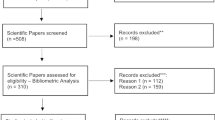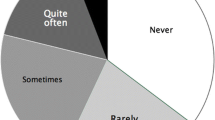Abstract
Food has become a prominent object of everyday moral discussions. This study examines how gender, political orientation, and country of origin are connected to moral foundation endorsement in food-related moral thinking. Respondents were university students (N = 371) from Finland, Denmark, and Italy who completed a word association task, in that given stimulus words were “ethical food” and “unethical food.” Results showed a presence of five moral foundations in the data, and indicated high prevalence of the Purity/Sanctity foundation in food-related moral thinking. As expected, gender differences emerged in the endorsement of the Fairness/Reciprocity and the Purity/Sanctity foundations. Also, between-country differences emerged in four of the five moral foundations, indicating that even within Europe countries may differ from each other in their endorsement of foundations. The results also verified the previously found effect of political orientation in three of the five moral foundations, although the study used a completely new and different type of method compared with previous studies. The study concludes by proposing more cross-national comparative studies where the focus is on the specific objects of moral thinking.

Similar content being viewed by others
References
Bäckström, A., Pirttilä-Backman, A.-M., & Tuorila, H. (2004). Willingness to try new foods as predicted by social representations and attitude and trait scales. Appetite, 43(1), 75–83.
Chapman, H. A., Kim, D. A., Susskind, J. M., & Anderson, A. K. (2009). In bad taste: evidence for the oral origins of moral disgust. Science, 323(5918), 1222–1226.
Fairtrade Labeling Organizations International. (2010). Growing stronger together. Annual Report 2009–10. http://www.fairtrade.net/fileadmin/user_upload/content/2009/resources/FLO_Annual-Report2009_komplett_double_web.pdf. Accessed 25 November 2011.
Flere, S., & Lavrič, M. (2008). On the validity of cross-cultural social studies using student samples. Field Methods, 20(4), 399–412.
Gilligan, C. (1982). In a different voice: Psychological theory and women’s development. Cambridge: Harvard University Press.
Graham, J., Haidt, J., & Nosek, B. A. (2009). Liberals and conservatives rely on different sets of moral foundations. Journal of Personality and Social Psychology, 96(5), 1029–1046.
Graham, J., Nosek, B. A., Haidt, J., Iyer, R., Koleva, S., & Ditto, P. H. (2011). Mapping the moral domain. Journal of Personality and Social Psychology, 101(2), 366–385.
Guerra, V. M., & Giner-Sorolla, R. (2010). The community, autonomy, and divinity scale (CADS): A new tool for the cross-cultural study of morality. Journal of Cross-Cultural Psychology, 41(1), 35–50.
Haidt, J., & Graham, J. (2007). When morality opposes justice: Conservatives have moral intuitions that liberals may not recognize. Social Justice Research, 20(1), 98–116.
Haidt, J., Graham, K., & Joseph, C. (2009). Above and below left-right: Ideological narratives and moral foundations. Psychological Inquiry, 20(2–3), 110–119.
Haidt, J., & Joseph, C. (2004). Intuitive ethics: How innately prepared intuitions generate culturally variable virtues. Dædalus, 133(4), 55–66.
Haidt, J., & Kesebir, S. (2010). Morality. In S. Fiske, D. Gilbert, & G. Lindzey (Eds.), Handbook of social psychology (5th ed., Vol. 2, pp. 797–832). New Jersey, US: Wiley.
Helkama, K. (2009). Moraalipsykologia. Edita, Porvoo: Hyvän ja pahan tällä puolen.
Høyer Toft, K. (2012). GMOs and global justice: Applying global justice theory to the case of genetically modified crops and foods. Journal of Agricultural and Environmental Ethics, 25(2), 223–237.
Inbar, Y., David, A., Pizarro, D. A., & Bloom, P. (2009). Conservatives are more easily disgusted than liberals. Cognition and Emotion, 23(4), 714–725.
Jaffee, S., & Hyde, J. (2000). Gender differences in moral orientation: A meta-analysis. Psychological Bulletin, 126(5), 703–726.
Jensen, L. A. (2008). Through two lenses: A cultural-developmental approach to moral psychology. Developmental Review, 28(3), 289–315.
Joseph, C., Graham, J., & Haidt, J. (2009). The end of equipotentiality: A moral foundations approach to ideology-attitude links and cognitive complexity. Psychological Inquiry, 20(2–3), 172–176.
Juujärvi, S. (2005). Care and justice in real-life moral reasoning. Journal of Adult Development, 12(4), 199–210.
Kohlberg, L. (1984). The psychology of moral development. New York, US: Harper and Row.
Koivisto Hursti, U. -K., & Magnusson, M. K. (2003). Consumer perceptions of genetically modified and organic foods. What kind of knowledge matters? Appetite, 41(2), 207–209.
Korthals, M. (2007). The ethics of food production and consumption. In L. Frewer & H. van Trijp (Eds.), Understanding consumers of food products (pp. 624–642). Cambridge, UK: Woodhead.
Mäkiniemi, J.-P., Pirttilä-Backman, A.-M., & Pieri, M. (2011). Ethical and unethical food: Social representations among Finnish,Danish and Italian students. Appetite, 56(2), 495–502.
McAdams, D. P., Albaugh, M., Farber, E., Daniels, J., Logan, R. L., & Olson, B. (2008). Family metaphors and moral intuitions: How conservatives and liberals narrate their lives. Journal of Personality and Social Psychology, 95(4), 978–990.
Moral Foundations org. (2011a). Moral foundations questionnaire. http://moralfoundations.org/questionnaires. Accessed 25 Aug 2011.
Moral foundations org. (2011b). Moral foundations dictionary. http://moralfoundations.org/resources. Accessed 25 Aug 2011.
Moral foundations org. (2011c). Moral foundations sacredness scale. http://moralfoundations.org/questionnaires. Accessed 25 Aug 2011.
Myyry, L., & Helkama, K. (2007). Socio-cognitive conflict, emotions and complexity of though in real-life morality. Scandinavian Journal of Psychology, 48(3), 247–259.
Nordsieck, W. (2011). The database about parliamentary elections and political parties in Europe. http://www.parties-and-elections.de/. Accessed 25 Nov 2011.
Onyango, B. M., Hallman, W. K., & Bellows, A. C. (2007). Purchasing organic food in US food systems: A study of attitudes and practice. British Food Journal, 109(5), 399–411.
Pluhar, E. B. (2010). Meat and morality: Alternatives to factory farming. Journal of Agricultural and Environmental Ethics, 23(5), 455–468.
Rozin, P., Kurzer, N., & Cohen, A. B. (2002). Free associations to “food”: The effects of gender, generation and, culture. The Journal of Research in Personality, 36(5), 419–441.
Schösler, H., de Boer, J., & Boersema, J.J. (2012). The Organic Food Philosophy: A Qualitative Exploration of the Practices, Values, and Beliefs of Dutch Organic Consumers Withina Cultural–Historical Frame. Journal of Agricultural and Environmental Ethics, April 2012.
Shweder, R. A., Much, N. C., Mahapatra, M., & Park, L. (1997). The “big three” of morality (autonomy, community, divinity), and the “big three” explanations of suffering. In A. Brandt & P. Rozin (Eds.), Morality and Health (pp. 119–169). New York, US: Routledge.
Special Eurobarometer. (2005). Special Eurobarometer 225 “Social values, Science and Technology.” Wave 63.1 — TNS Opinion and Social.http://ec.europa.eu/public_opinion/archives/ebs/ebs_225_report_en.pdf. Accessed 30 Aug 2011.
Steptoe, A., Pollard, T. M., & Wardle, J. (1995). Development of a measure of the motives underlying the selection of food: The food choice questionnaire. Appetite, 25(3), 267–284.
Straus, M. A. (2009). The national context effect. An empirical test of the validity of cross-national research using unrepresentative samples. Cross-Cultural Research, 43(3), 183–205.
The Council of the European Union. (2007). Council Regulation (EC) No 834/2007 of 28 June 2007 on organic production and labelling of organic products and repealing Regulation (EEC) No 2092/91. http://eur-lex.europa.eu/LexUriServ/LexUriServ.do?uri=OJ:L:2007:189:0001:0023:EN:PDF. Accessed 25 April 2012.
Thøgersen, J. (2010). Country differences in sustainable consumption: the case of organic food. Journal of Macromarketing, 30(2), 171–185.
Vainio, A. (2003). One morality — or multiple moralities? (Doctoral dissertation). University of Helsinki, Faculty of Social Sciences, Department of Social Psychology. http://ethesis.helsinki.fi/julkaisut/val/sosps/vk/vainio/onemoral.pdf. Accessed 25 Aug 2011.
van Leeuwen, F., & Park, J. H. (2009). Perceptions of social dangers, moral foundations, and political orientation. Personality and Individual Differences, 47(3), 169–173.
Vasquez, K., Keltner, D., Ebenbach, D. H., & Banaszynski, T. L. (2001). Cultural variation and similarity in moral rhetorics: Voices from the philippines and the united states. Journal of Cross-Cultural Psychology, 32(1), 93–120.
Verlegh, P., & Steenkamp, J.-B. (1999). A review and meta-analysis of country-of-origin research. Journal of Economic Psychology, 20(5), 521–546.
Wagner, W. (1997). Word associations in questionnaires. A practical guide to design and analysis, 3. Methodology Inst, London School of Economics and Political Science, UK (Series in Social Research Methods).
Willer, H., & Kilcher, L. (Eds.). (2012). The world of organic agriculture — Statistics and emerging trends 2012. Research Institute of Organic Agriculture (FiBL), Frick, and International Federation of Organic Agriculture Movements (IFOAM), Bonn.
Wright, J. C., & Baril, G. (2011). The role of cognitive resources in determining our moral intuitions: Are we all liberals at heart? Journal of Experimental Social Psychology, 47(5), 1007–1012.
Acknowledgments
We would like to thank the anonymous reviewers of an earlier version of this paper for their helpful comments.
Author information
Authors and Affiliations
Corresponding author
Rights and permissions
About this article
Cite this article
Mäkiniemi, JP., Pirttilä-Backman, AM. & Pieri, M. The Endorsement of the Moral Foundations in Food-Related Moral Thinking in Three European Countries. J Agric Environ Ethics 26, 771–786 (2013). https://doi.org/10.1007/s10806-012-9401-3
Accepted:
Published:
Issue Date:
DOI: https://doi.org/10.1007/s10806-012-9401-3




